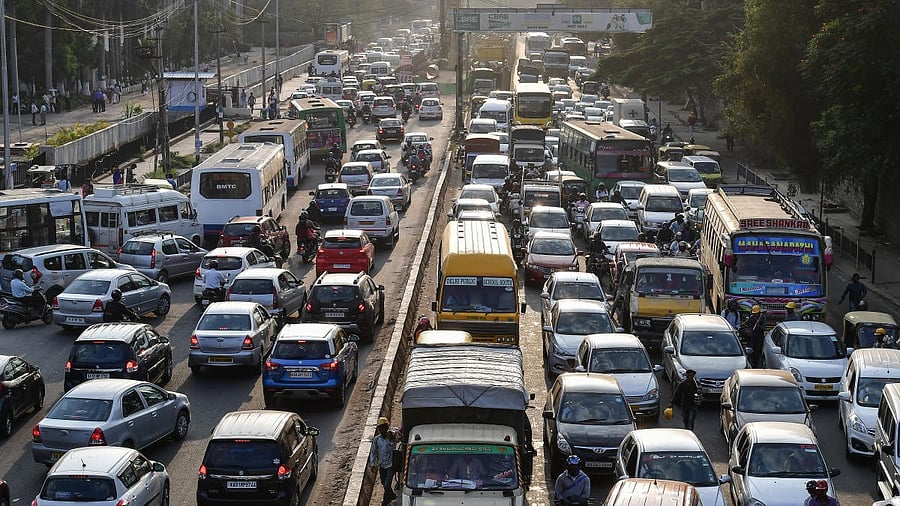
Traffic on Bengaluru roads.
Credit: DH File Photo
Bengaluru: The Karnataka High Court has said that the Motor Vehicles Act, 1988, calls for a re-examination with regards to the description of vehicles in relation to the collection of toll.
“The Union Ministry of Surface Transport would do well to undertake a review and insert appropriate clarificatory definitions to address the evolving complexities of vehicular classifications and toll collection.
"The present dispute, while resolved within the existing legal rubric, reveals the need for statutory refinement,” Justice M Nagaprasanna said while dismissing the petition filed by the Karavali Bus Owner's Association and others.
The petitioners claim possessing existing stage carriage permit holders operating in Dakshina Kannada and Udupi Districts.
They claimed the buses operated by them move through toll plazas in these two districts and contended that the fare charged on every trip of each vehicle should be based on the laden weight of the vehicles, which is between 7,500 and 12,000 kg, insofar as mini vehicles are concerned.
The petitioners stated that the Udupi Sasthana Tollway Private Limited has been deducting additional toll charges from the FASTag wallet account of all the stage carriage permit holders of the Association, in the form of a “charge back process” from the FASTag wallet account as and when it wishes to do so.
Their representation to the National Highway Authority of India (NHAI) against this excess collection of toll was rejected. The NHAI held that in terms of the schedule appended to the concession agreement, the debit adjustment followed as there was a mismatch found in relation to the description of vehicles.
According to the petitioners, the buses operated by them cannot be categorised as buses, but as minibuses since they weigh less than 12,000 kg. Therefore, deduction at the toll plaza, holding that there is a mismatch between the registration of vehicles and the capacity or what is uploaded into the FASTag account, cannot be made, the petition said.
Justice Nagaprasanna noted that the description of a vehicle from 7,501 to 12,000 kg is said to be a medium passenger vehicle, and whichever vehicle of laden weight as aforesaid is described as a bus, and the said endorsement has generated certain obfuscation.
“The obfuscation is owing to the provisions of the Motor Vehicles Act. Fee collection is not dealt with under the Act; it is dealt with under the Rules framed under the Highways Act. If the argument of the petitioners is to be accepted, it would lead to huge losses to any person for the reason that the Association is wanting to take advantage of the vacuum under the MV Act. Notwithstanding the registration of the vehicles as buses, the vehicle owners describe their vehicles as minibuses, and, for illustration, when they were to pay Rs 1,000 as a toll fee, they will pay Rs 500, notwithstanding the description of it as a bus. Therefore, we have to fall back upon the Highways Act and the Rules, and the agreement between NHAI and the concessionaire,” Justice Nagaprasanna said.
The court further said, “The dispute mismatch is noticed, and therefore, the fee in terms of the registration certificate is collected. It is not the case of the petitioners that a fee beyond the fee prescribed for a bus is collected. It is their argument that these vehicles, though registered as buses, cannot be treated as buses at all for the collection of toll fees. What is discernible is that while the Motor Vehicles Act defines classes of vehicles for regulatory purposes, toll classification is governed solely by the National Highways Act, the Fee Rules, and the Concessionaire agreement. The legal foundation for toll adjustments due to vehicle mismatch is both statutory and contractual, making the petitioners’ grievance legally untenable.”